Would you like to get PMBOK 7th Edition PDF Download? Have you been searching for where to get PMBOK 7th edition free download pdf? Have you lost all hopes of finding where to get PMBOK Latest Edition Free Download PDF? Would you like to know about the PMBOK 7th edition release date? A book like PMBOK 7th Edition PDF is a great asset to anyone preparing to get the PMP Certification. right here on Knowdemia, we offer you the latest news about PMP PMBOK 7th edition and how to get PMBOK 7th edition PDF download. So, relax because you will be getting PMBOK 7th edition pdf free download at the end of this article.
PMI announced the PMBOK® 7th Edition PDF exposure draft in January 2020 for the review of the project management community. If you are looking to get your PMP certification, PMBOK is one of the most important resources when getting ready for the PMP exam. Most of the PMP training providers prepare PMP study materials and resources based on the PMBOK content. Therefore, PMBOK 7th edition PDF will be the guide for PMP and CAPM certification tracks of PMI and the training providers will be updating their materials based on this change.
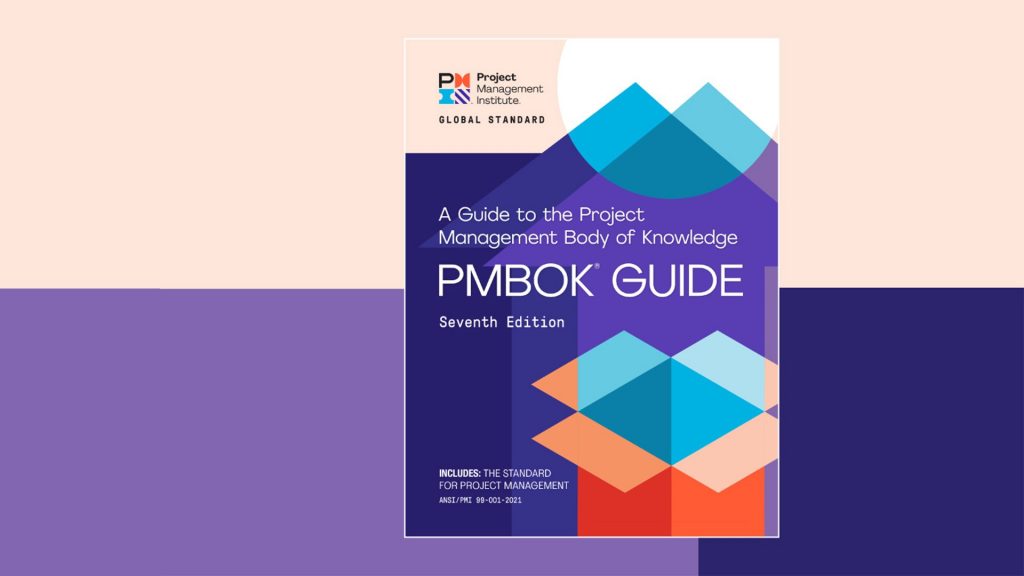
The world is changing and all rules & principles of project management are changing too, so the PMI try to stay aligned with the world trends by providing new updates to its materials. This article provides a brief insight into the work still progressing on the PMBOK 7th edition that was estimated to be ready for publication in 2021.
Concepts in this article are still underway, which means they can change in a few months but the vision and the direction may stay the same.
Table of Contents
What’s new about the standard?
What’s Changing?
Perhaps most important, the updated Standard adopts a principles-based format in order to be more inclusive of the full range of approaches to value delivery—not just the predictive approach traditionally associated with project management. We must respect the project professional’s right to choose the correct approach for the project at hand—whether that’s predictive, agile, adaptive, or a hybrid approach.
The 12 governing Principles in the Standard are built around a set of statements that best summarize the generally accepted actions and behaviors of project management practice regardless of development approach. The Principles provide broad parameters within which project teams can operate and remain aligned with the intent of the Principle.
The seventh edition of the Guide builds on the Standard and is structured not around Knowledge Areas and ITTOs but around Project Performance Domains, a group of related activities that are critical for the effective delivery of project outcomes. The Domains include important management practices but are not prescriptive “how to’s.” Each section explains why the specific domain is important for effective project management.
The Guide also has an expanded section on tools and techniques titled Models, Methods, and Artifacts. In-depth information about how to apply these tools and techniques by project type, development approach, and industry sector is presented on a new, digital platform called PMIstandards+™. In fact, the entire PMBOK® Guide – Seventh Edition will launch with a digital and interactive element, delivered through PMIstandards+™.
When we talk about the PMBOK guide we talk about 2 separate documents, in the PMBoK guide we have the Standard for Project Management and the Guide to the Project Management Body of Knowledge.
The standard in the 6th edition of PMBOK was based on business processes that can be documented and tailored with the aim of improving and maximizing efficiency and minimizing risks. Those processes help to assess performance and they have a prescriptive nature in some ways. While in the 7th edition, standards are moving to the principle-based approach and becoming less prescriptive. The previous editions were based more on a predictive approach, but the new edition focuses more on the full value delivery landscape.
Standards in the 7th edition are considered by an authority or by general consent as a basis of comparison (or as an approved mode) and the development for the standards are following the ANSI Essential requirements that consist of: Openness — Transparency — Due process and Consensus.
The standard will contain 3 sections that are:
- Introduction: that describes the purpose of the standards, defines the key terms and concepts, and identifies the standard’s audience.
- A System for Value Delivery: this section talks about how organizations can create value, describes how governance supports a system for value delivery, identifies internal and external factors that influence projects and the delivery value, and identifies ways that portfolios, programs, projects, and products related.
- Project Management Principles: this section talks about how principles can guide our behavior and thinking to stay aligned with our project’s vision and goals.
Unlike the 6th edition, The new PMBOK Guide will start with the standard section instead of the Guide to the Body of Knowledge and the following image summarizes the main transformations between both editions.
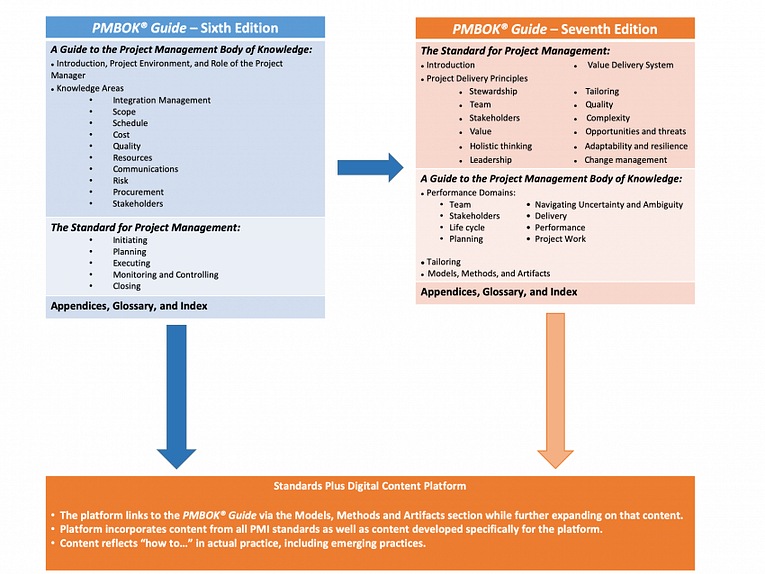
Why is PMI is moving to a principle-based standard?
Why Change?
The impetus for updating the PMBOK® Guide had been building for several years. Rapid enhancements in technology and the need for organizations and practitioners to more quickly adapt to changes in the market have caused their profession to evolve. Practitioners are now tasked with identifying the right delivery approach (predictive, agile, or hybrid) to get the job done and deliver value. To make sure the PMBOK® Guide – Seventh Edition remains relevant, it must reflect this flexibility and assist the practitioner in managing the project at hand to deliver outputs that enable envisioned outcomes.
This was reinforced by information gathered from a wide range of professionals around the world—if PMI wants to remain relevant and continue to meet the needs of customers and the professional community, they have to update their approach to both the Standard and the Guide portion.
PMI Principals have to be stable since they reflect the foundation for practices. Practices can change and evolve over time and according to the project environment but the principles on which they were founded should remain the same. A lot of research was made before moving into this new perspective, and those researchers concluded that the old standards were dry, hard to read, too difficult to use in real life, focused too much on predictive work, and became out of date.
Unlike the method which is based on the principle that provides a level of abstraction that can incorporate multiple perspectives or approaches, set a parameter within which to operate and acknowledge that there are many ways to remain aligned. Moving to principle-based standards helps recognize the significant distinction among projects, programs, and portfolios and among the approaches for managing them. The new vision consists of the creation of a new stable standard and keeping the Guide to the Project Management Body of Knowledge more flexible.
What is a principle-based standard?
Principles are rules, laws, Guidelines, or facts that guide the behavior or help for evaluation. Principles never tell how things should be done, they are not prescriptive and they can not be considered as policies or as checklist objectives. Principals are actionable, culture neutral, and can be realized in different ways, provide clear boundaries, and can be applied across the value delivery landscape. Below is an example of a principle:
Engage stakeholders proactively and to the degree to contribute to project success and customer satisfaction.
The above statement doesn’t tell how we should do the work to aim this goal, but it provides a rule or behavior that should be achieved whatever is the methodology because principals only encore behaviors and actions but never prescribe them. Standards were process-based in the previous editions of the PMBoK Guide, they focused more on how things should be done which created a problem when we tried to tailor them, but the principle-based standards focus more on what should be done no matter how it would be.
How were the principles identified?
Principles are the result of multiple researches based on a variety of resources like guides and standards (ex: Prince2, IPMA… etc) plus some research based on market studies and team experiences.
Those standards had to stay aligned with the PMI Standards development process and respect ANSI essential requirements.
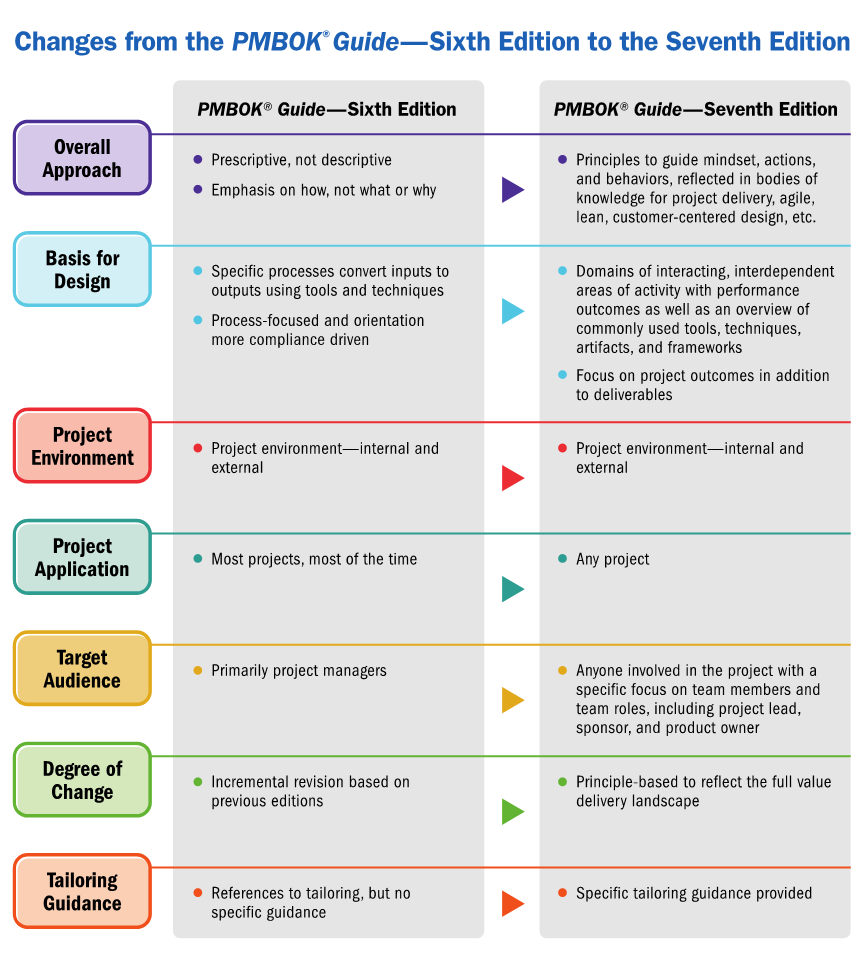
Those principles were first collected as statements and then organized into affinity diagrams to determine which are the right way to express them. This work was done by a highly diverse team and revised many times before providing the final version.
Here is an example of the proposed project management principle labels:
- Be a diligent, respectful, and caring stewards.
- Create a collaborative project team environment
- Effectively engage with stakeholders
- Focus on value
- Recognize, evaluate and respond to system interactions
- Demonstrate leadership behaviours
- Tailor based on context
- Build quality into processes and deliverables
- Navigate complexity
- Optimize risk responses
- Embrace adaptability and resilience
- Enable change to achieve the envisioned future state
As we said previously the work on the elements discussed is still in progress and the work on the PMBoK is estimated to finish by the end of 2020, meanwhile what we should keep in mind is that the 7th edition will be more founded on principles than processes.
When PMBOK 7th Edition Will Be Published?
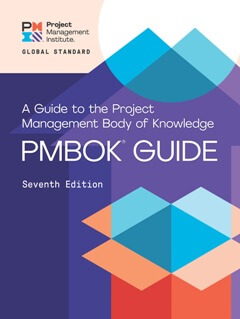
The recent PMBOK 7th Edition is now available.
For the latest PMBOK 7th edition, knowledge areas will be no longer a part of it. The publication will primarily about performance domains. You will come across the advanced digital platform – Standards Plus associated with PMBOK. The recent edition will highlight the emerging and upcoming project delivery practices that can be used by project practitioners.
It is important to note that PMP exam is for the Profession of Project Management and PMBOK Guide doesn’t serve as the syllabus of the PMP Exam. To be able to attempt the PMP Exam successfully you should begin the process from Exam content Outline 2019.
PMBOK Versions
- PMBOK 1 – 1996 – ( 9 KA, 37 Processes)
- PMBOK 2 – 2000 – ( 9 KA, 39 Processes)
- PMBOK 3 – 2005 – ( 9 KA, 44 Processes)
- PMBOK 4- 2008 – ( 9 KA, 42 Processes)
- PMBOK 5- 2013 – ( 10 KA, 47 Processes)
- PMBOK 6- 2017 – (49 Processes, 10 KA and 5 Process Groups)
- PMBOK 7 – Q4 2020 (12 Principles and 8 performance Domains)
All editions of the PMBOK Guide till version 6 have been process-based, meaning that the primary, fundamental building blocks were processes, with their inputs and outputs connecting them and creating an integrated network that can be effective in projects. Process-based perspective is limited to what is considered in the standard. This does not mean that process-based approaches are not relevant or useful anymore. Many organizations and project management practitioners continue to use conventional project management delivery methods. Conventional approaches remain relevant in the context of PMBOK 7th Edition as well.
Can PMBOK 7th Edition PDF be downloaded for free?
Generally, PMP Aspirants look for resources such as PMBOK 7th edition pdf book to download for free from the internet. But it is not legal!
Hence, we highly recommend you to PURCHASE THE BOOK and it will be delivered to your address. But you can also get a free PDF Copy below.
Get PMBOK 7th Edition PDF Free Download Below:
Click on the button below to download PMBOK 7th Edition PDF below (Special thanks to the contributor that made this available 🙂
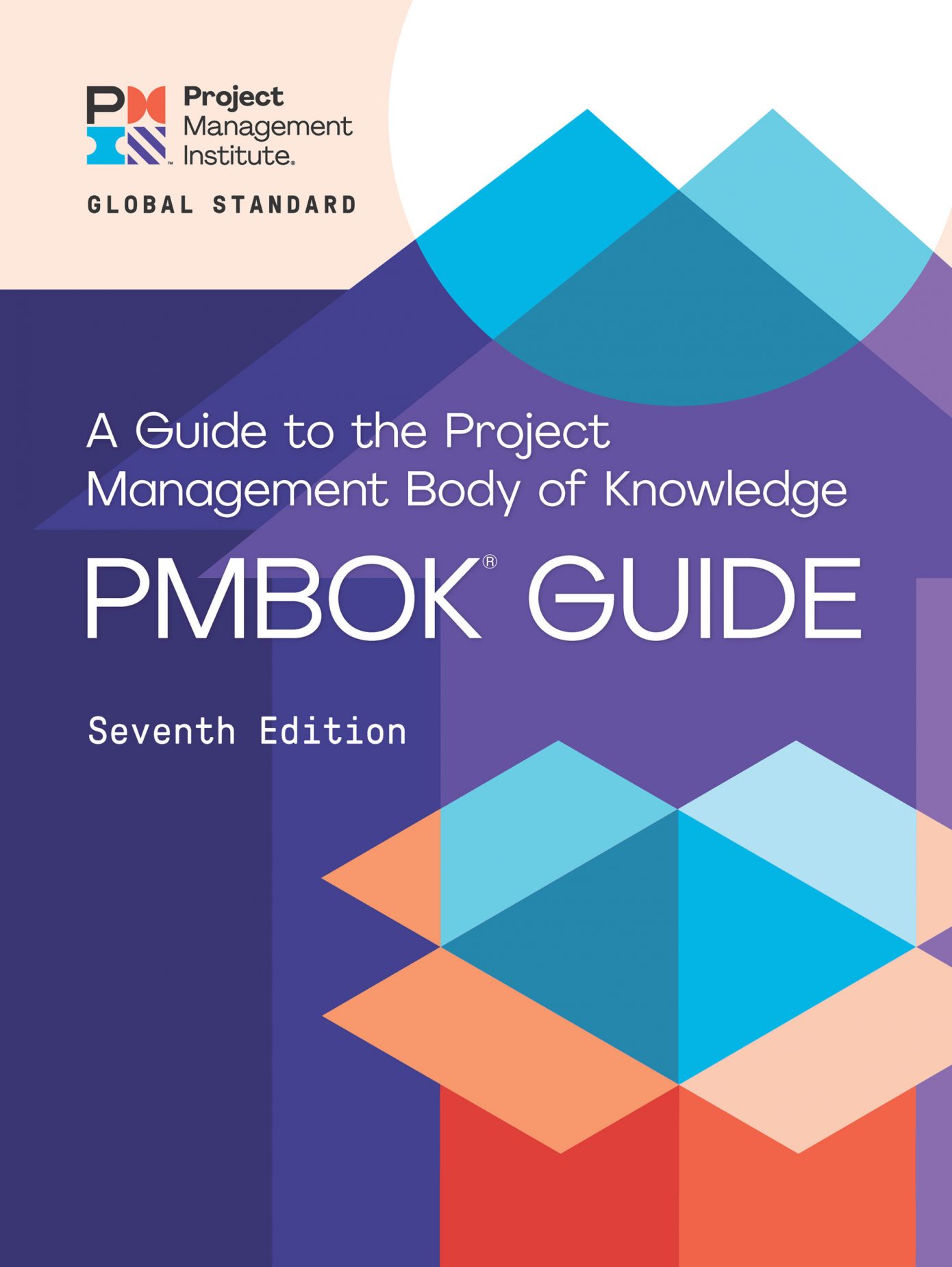
Thanks. I’ve been looking for this.
Thanks.
Thanks a lot.
thanks
Thank you for the generosity! Really appreciate your help
I know download. Pls help me to download the 7th edition book.
Thanks have been looking for it
You are welcome Shalina, we’re always here for you.
is it the whole syllabus?
Yes
Thanks a ton 🙂
Thanks for allowing incoming Certifed Professional In PMP Exam to get this insightful material.
Good book
thanks, great effort
Is this a new PMP book? Exam will be based on this now?
Yes.
thanks !!
I would love training in Project planning and management training
aWESOME
how do you download the 7th edition
Downloaded the PDF, thank you, now I can proceed preparing for my PMP! TY again.
Thanks for this great offer